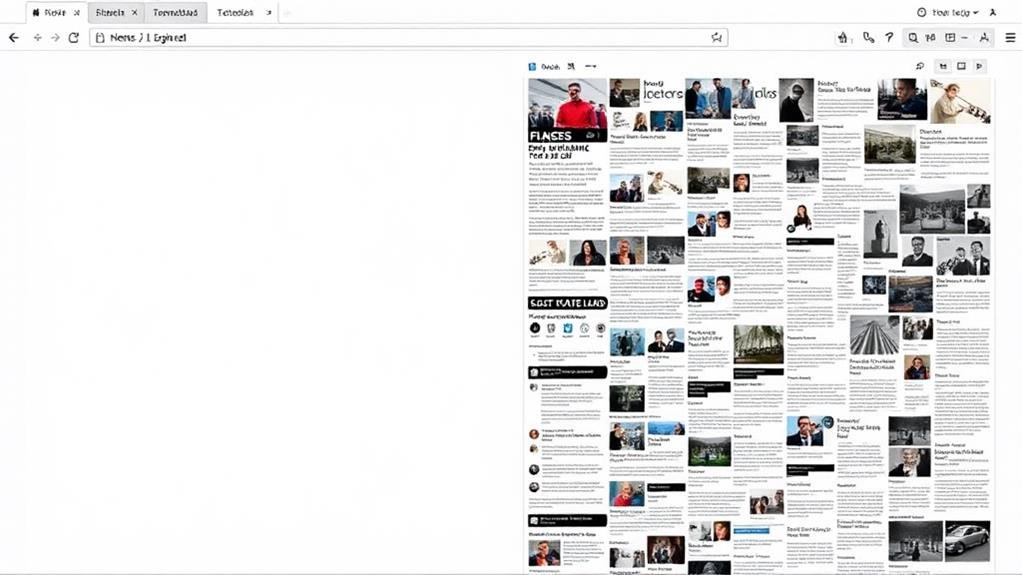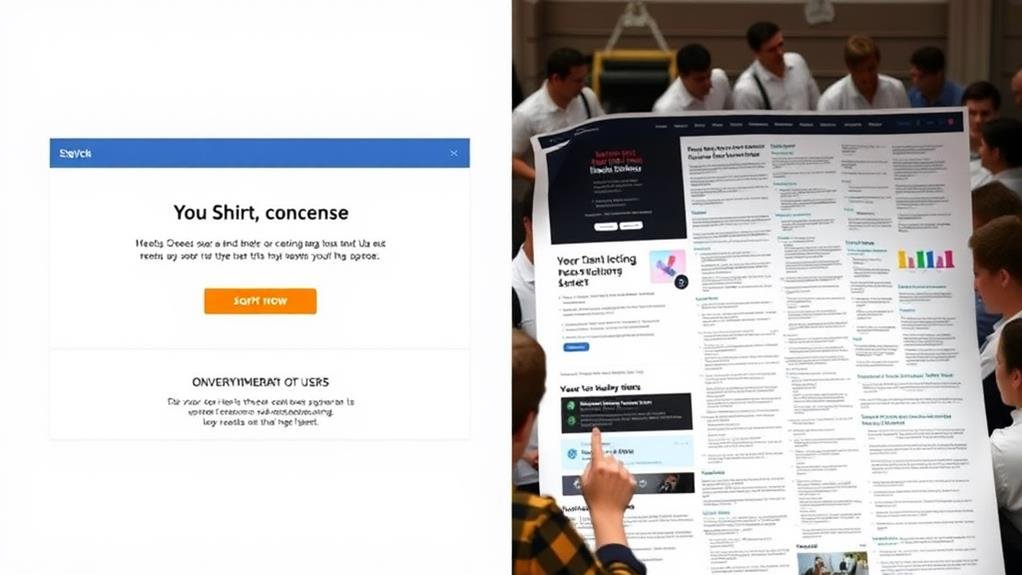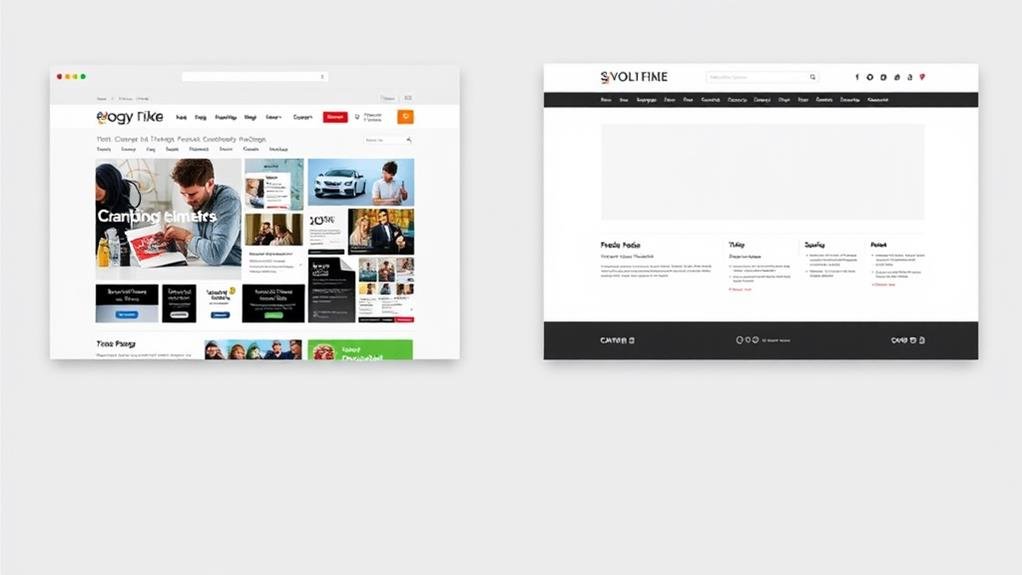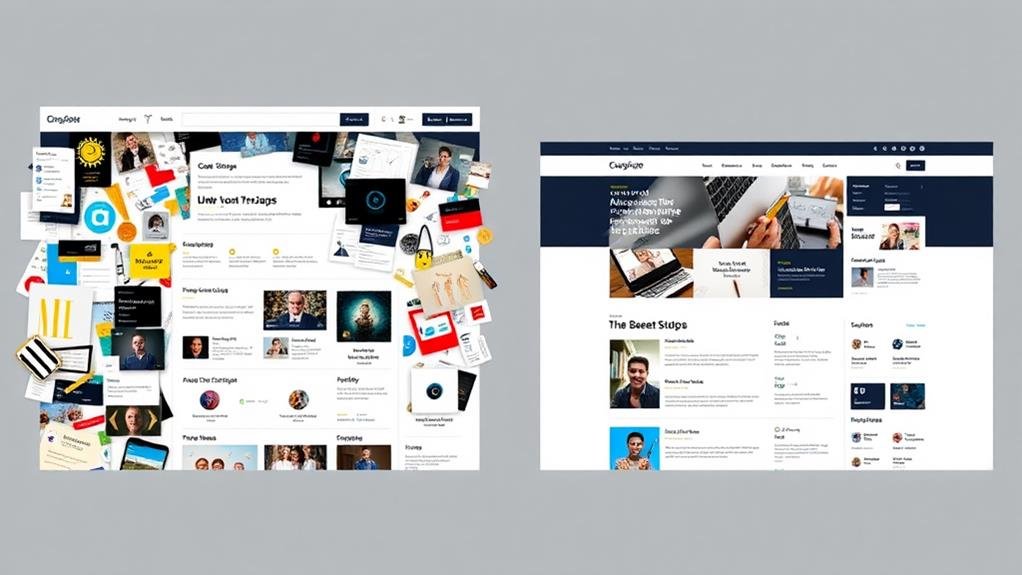
When crafting your homepage, you're probably wondering what the ideal length is to engage your audience without overwhelming them. The answer lies in finding a balance between providing valuable information and keeping your content concise and scannable. While there's no one-size-fits-all answer, a common benchmark is 500-700 words, focusing on quality and relevance. Aim for clear, concise language, and use headings, subheadings, and bullet points to break up the content. By prioritizing quality over quantity, you'll make every word count and entice visitors to take action - and the best part? There's more to investigate on this topic, and you're just getting started.
When it pertains to crafting a web page, one vital consideration is its length. You want to ensure your page provides enough information to answer readers' questions without overwhelming them.
The ideal length varies, but it's essential to prioritize quality over quantity. While a minimum of 300 words is recommended, it's not about reaching a specific word count. Instead, focus on writing comprehensive, informative content that serves the purpose of each web page.
Your website's content should be concise, yet informative, addressing user needs and communicating value clearly.
The average top-ranking web page has 1,890 words, but longer isn't always better. A common benchmark is 500-700 words, but what matters most is the quality and relevance of your content.
Ultimately, your page's length should be determined by its purpose, providing enough information to engage readers without overwhelming them, and leaving room for them to explore more.
As you craft your website's content, you're likely wondering how the length of your pages impacts your search engine optimization (SEO) efforts.
From an SEO point of view, writing your website's content with a focus on quality is vital. While a minimum of 300 words is recommended, it's imperative to bear in mind that quality matters more than quantity. Google wants users to find the best possible answer to their queries, which often requires more in-depth content.
Average top-ranking web pages have around 1,890 words, but this doesn't mean longer is always better.
The focus should be on writing concise, informative copy that addresses user needs. This approach can improve your SEO, as Google prioritizes quality over quantity.
Thin or low-quality content can negatively impact your SEO, so it's vital to aim for a minimum of 300 words while prioritizing quality. Bear in mind, the goal is to provide value to users and establish trust with Google, rather than simply meeting a word count.
Focus on writing thorough, informative content that serves the specific purpose of each website page, and you'll be on the right track.

Clarity is the cornerstone of effective content, and vital to acknowledge that quality surpasses quantity every time.
In the context of your homepage, prioritizing quality over quantity is paramount.
You want to make sure your web page is concise, yet informative, and that every word counts.
1. Less is more: A shorter page length doesn't necessarily mean lower quality.
In fact, it often means you've taken the time to refine your message and eliminate unnecessary words.
2. Focus on your message: What do you want to communicate to your visitors?
Make sure your homepage clearly conveys your unique value proposition and resonates with your target audience.
3. Use clear and concise language: Avoid using jargon or overly technical terms that might confuse your visitors.
Instead, opt for simple, easy-to-understand language that gets your point across.
4. Make it scannable: Break up your content into bite-sized chunks, using headings, subheadings, and bullet points to make it easy for visitors to quickly scan and understand your homepage.
By the time visitors land on your homepage, they're likely to be saturated with information from their online path, making it crucial to craft compelling copy that cuts through the clutter.
You want to engage them immediately, so focus on writing concise, scannable content that communicates your unique value proposition.
When it comes to writing for your homepage, bear in mind that length matters.
Aim for a balance between providing enough information and overwhelming your visitors.
You want to pique their interest without bogging them down with too much content.
A good rule of thumb is to keep your paragraphs short and sweet, with three to five sentences each.
Use headings, subheadings, and bullet points to break up the content and make it easy to scan.
This will help visitors quickly understand what you're about and what you can do for them.

When crafting a landing page, you're faced with a delicate balancing act: providing enough information to engage your audience without overwhelming them.
The ideal length for a landing page varies depending on the purpose, audience, and complexity of the topic, but here are some guidelines to keep in mind:
It's vital to certify that the content meets these criteria, and prioritize its significance, relevance, and impact on the audience over the word count.
What makes a homepage truly effective? It's not just about the length for your website; it's about the content strategy for your web pages.
A well-crafted homepage should prioritize clarity and simplicity, using clear and concise language to communicate your business's value proposition and unique selling points. Aim for a minimum of 300 words to establish credibility and trust with search engines and users.
Breaking up text with headings, bullet points, and images can help improve readability and make the content more scannable.
This increases the chances of visitors engaging with the content and taking action. Don't forget to include a clear call-to-action (CTA) to entice visitors to take the next step, whether it's signing up for a newsletter, making a purchase, or exploring the website further.
A well-structured homepage should also prioritize user experience, with a clear navigation menu, fast loading speed, and mobile-friendliness to guarantee a seamless experience for visitors across different devices.

How do misconceptions about content length hold you back from creating an effective homepage?
One common misconception is that there's a "right length" for website content.
The honest answer is, there isn't one. Every website, business, and web page is unique, and the main goal is to get the message across effectively and entice the reader to take action.
Some common misconceptions about content length:
Crafting an effective homepage requires a deep understanding of your target audience and their needs.
As you design your homepage, you should prioritize providing a seamless user experience for your website visitors. This is vital in digital marketing, as it sets the tone for their entire path with your brand.
To achieve this, focus on creating a clear and concise message that resonates with your audience. Break up your content with headings, bullet points, and images to facilitate readability and improve user experience.
A well-structured homepage with a clear hierarchy of information helps users quickly find what they're looking for, reducing bounce rates and increasing engagement.
By putting your users foremost, you'll be able to entice them to take action, whether it's to learn more, sign up, or make a purchase.

In terms of your homepage content, quality trumps quantity every time.
You want to make certain every word on that one page counts, conveying your business's message and value proposition effectively.
When writing website content, keep in mind the following best practices:
You've nailed the basics of homepage content best practices, now it's time to tackle the ideal length for your homepage.
In terms of finding the right word count, one thing is clear: quality trumps quantity. While a minimum of 300 words is recommended to provide sufficient information to users and search engines, the ideal length varies depending on the purpose, industry, and target audience.
Some successful homepages have as few as 100 words or as many as 1,000 words.
The key is to focus on writing concise, informative copy that addresses user needs, rather than padding the homepage with unnecessary content to reach a specific word count.
Using clear, concise language and breaking up text with headings, bullet points, and images can help improve user experience and readability, regardless of the word count.
You're wondering how long your homepage should be, and the answer is, it depends! Aim for a concise, focused message with a minimum of 300 words for SEO, but prioritize clarity, readability, and a clear call-to-action above the fold.
You're wondering how large your homepage should be with regard to total size and layout. Aim for a clean, simple design that's easy to navigate, with a clear visual hierarchy and whitespace to prevent overwhelming users.
You're wondering what the ideal length for web page content is. Well, there's no one-size-fits-all answer, but you should aim for 200-1,000 words, focusing on quality over quantity, and prioritizing concise, informative copy that addresses user needs and communicates value.
You spend around 10-20 seconds on a homepage, and if it grabs your attention, you might stick around for 30-40 seconds like top-ranking websites do, but most people bail after 15 seconds or less, so make it count!
So, what's the ideal length for a homepage? The answer is, it depends. While there's no one-size-fits-all solution, focus on creating a user-centric experience that balances content quality with concise communication. Aim for a length that effectively conveys your message, supports your SEO goals, and resonates with your audience. Remember, it's not about the word count, but about crafting a compelling narrative that drives engagement and conversion.